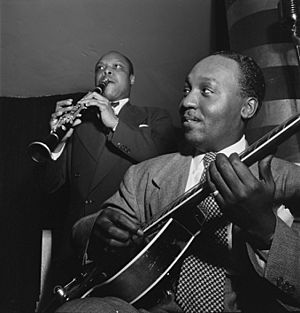Café Society facts for kids
Café Society was a famous New York City nightclub that was open from 1938 to 1948. It was located in Greenwich Village and managed by Barney Josephson. This club was special because it was the first racially integrated nightclub in the United States.
Contents
A Special Kind of Nightclub
Josephson wanted to create a club where talented African American performers could shine. He also wanted it to be like the political clubs he had seen in Europe. Unlike many places at the time, Café Society welcomed both black and white customers equally. This was a big deal because many clubs, like the Cotton Club, only allowed black performers but not black customers.
The Name and Its Meaning
Josephson chose the name "Café Society" to make fun of fancy nightclubs. He even advertised the club as "The Wrong Place for the Right People." This showed that his club was different from others. He opened a second club in 1940. The first one became "Café Society Downtown," and the new one was "Café Society Uptown."
A Stage for Great Talent
Café Society was known for featuring many amazing black musicians. The club often had a strong message. For example, Billie Holiday first sang her powerful song "Strange Fruit" there. Josephson made sure she ended her show with this song. She would then leave the stage so the audience would think about the song's important meaning.
The club also helped start the careers of many famous artists. With help from John Hammond, who was like the club's music director, performers like Ruth Brown, Lena Horne, Pearl Primus, Hazel Scott, Pete Johnson, Albert Ammons, Big Joe Turner, and Sarah Vaughan became well-known. Gospel groups such as the Dixie Hummingbirds and the Golden Gate Quartet also became popular with white audiences because of the club. Josh White was a very important star there for four years.
A Place for Important Discussions
Café Society was more than just a music club. It was also a place for many political events and fundraisers. These events often supported causes that aimed to help people, especially during and after World War II.
In 1947, Josephson's brother was questioned by a government committee. This led to negative comments from some writers, and the club's business dropped. As a result, Café Society closed the next year.
Today, the location of the original Café Society Downtown is home to the Axis Theatre Company.
See also
 In Spanish: Café Society para niños
In Spanish: Café Society para niños
 | Lonnie Johnson |
 | Granville Woods |
 | Lewis Howard Latimer |
 | James West |


